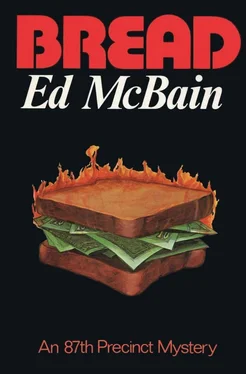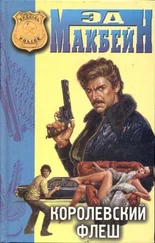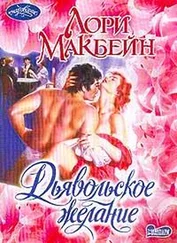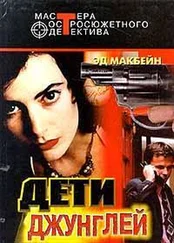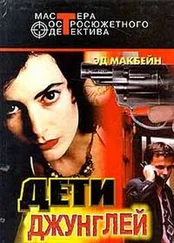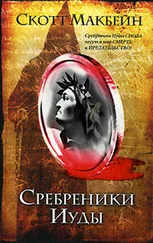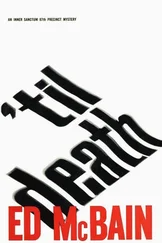The remaining possible motive was that someone had set the warehouse fire in order to conceal a crime. (Have you left jimmy marks on the windows and fingerprints all over the wall safe? So what? Just bum down the joint as you’re leaving.) Curious reasoning, admittedly, since Burglary/One was punishable by a maximum of thirty and a minimum of ten, whereas Arsons/One, Two, and Three were punishable respectively by forty, twenty-five, and fifteen — but who can fathom the intricate workings of the criminal mind? And whereas the warehouse fire had probably succeeded in obliterating any evidence of theft, it was highly improbable that anyone would steal an indeterminate amount of wooden animals and then set fire to the remainder of the stock to conceal such petty pilfering. Moreover, if someone had committed a crime at the warehouse and then committed arson to conceal the crime, it was ridiculous to believe he would later burn down Grimm’s house as a cover for the initial cover. Such an elaborate smoke screen was for the comic books.
Which left pyromania.
When Carella first learned about the warehouse fire, he’d thought it might have been set by a firebug, despite the fact that two night watchmen had been drugged — pyromaniacs will rarely go to such limits. But the minute he learned of the second fire, Carella knew for certain they were not dealing with a nut. In all his experience with pyromaniacs, he had never met a single one with any real motive for setting a fire. Most of them had done it for kicks, not always but often sexually oriented. They liked to watch the flames, they liked to hear the fire engines, they liked the excitement of the crowds, they liked the tumult and the frenzy. They ranged in age from ten to a hundred and ten, they were usually loners, male or female, intellectual or half-wit, corporation executive or short-order cook. Two of the pyros he’d arrested were male alcoholics. Another was a hysterical, pregnant woman. Still another said she’d set a fire only because she was suffering menstrual cramps. All of them had picked their fire sites at random, usually because the building looked “safe” — vacant, abandoned, or in a lonely, unpatrolled neighborhood.
Most firebugs were very sad people. Carella had known only one funny firebug during all his years as a cop, and he supposed that one couldn’t have been considered a true pyromaniac at all. He was, in fact, a man Carella had locked up for Armed Robbery. When the man was released from Castleview, he called Carella at the squadroom and told him to come over to his place right away, without his gun, or else he was going to set fire to his own kid brother. His kid brother happened to be thirty-six years old, a man who himself had been in and out of jail since the time he was fifteen. His barbecue, if carried out as threatened, would have caused very little grief up at the old squadroom. So Carella told his Castleview friend to go ahead and set fire to his brother, and hung up. Naturally, the man didn’t do it. But there were many nuts in the city for which Carella worked, and not all of them were in the Police Department, and he was sure that none of them had set Grimm’s fires.
Grimm’s warehouse was on Clinton Street and Avenue L, adjacent to the waterfront docks on the River Harb. The building was made of red brick, four stories high, with a padlocked cyclone fence running completely around it. A man in his sixties, wearing a watchman’s uniform, pistol holstered at his side, was standing inside the gate as Carella pulled up in his Chevy sedan. Carella showed him his police shield, and the man took a key from a ring on his belt and unlocked the gate for him.
“You with the 87th Squad?” he asked.
“Yes,” Carella said.
“Because they’ve already been here, you know.”
“Yes, I know that,” Carella said. “I’m Detective Carella, who are you?”
“Frank Reardon,” he said.
“Do you know the men who were on duty the night of the fire, Mr. Reardon?”
“Yep. Jim Lockhart and Lenny Barnes. I know them.”
“Have you seen them since?”
“See them every night. They relieve me every night at eight o’clock on the dot.”
“They mention anything about what happened?”
“Only that somebody doped them up. Wha’d you want to look at first, Mr. Carella?”
“The basement.”
Reardon locked the gate behind them, and then led Carella across a cobblestoned courtyard to a metal fire door on the side of the building. He unlocked the door with a key from the ring on his belt, and they went inside. After the bright sunlight outdoors, the small hallway they entered seemed much dimmer than it really was. Carella followed Reardon down a dark flight of stairs that terminated abruptly in a basement still flooded with water from the broken main. Half a dozen drowned rats were floating near the furnace. The shattered pipe was one of those huge, near-indestructible cast-iron jobs. It seemed evident to Carella that the arsonist had used an explosive charge on it. It also seemed evident that he had not set his fire in the basement of the building, it being difficult for fires to burn underwater.
“Want to take a little swim?” Reardon asked, and cackled unexpectedly.
“Let’s take a look upstairs, okay?”
“Nothing to see up there,” Reardon said. “Fire done a pretty good job.”
The fire had indeed done a pretty good job, nor was it difficult to understand how $500,000 worth of miniature wooden rabbits, puppy dogs, and pussycats had provided excellent tinder for a blaze of monumental proportions. The mess underfoot was a combination of waterlogged ashes and charcoal, with here and there a recognizable head, tail, or paw. The crates had probably been piled on metal tables, the scorched and twisted remnants of which had been shoved aside or thrown over by the firemen in their efforts to quench the flames. Hanging light fixtures with metal shades, their bulbs shattered by the heat, were spaced evenly across the high ceiling of the room. One of these fixtures caught Carella’s attention because a fire-frayed length of electrical wire was dangling from its bulb socket. He pulled a table over and climbed onto it. The length of wire was an extension cord equipped with a fitting that screwed into the socket ordinarily occupied by the bulb. The hanging wire had been burned short by the fire, but it was reasonable to assume it had once been long enough to reach from the fixture down to one of the tables.
Carella frowned.
He frowned because Andy Parker was supposed to be a cop, and cops are supposed to know that most criminal fires are not started with matches; since the whole idea of arson is to be far away from the place when it bursts into flame, such instant ignition is impractical and dangerous. Parker had mentioned that he’d conducted a thorough search for wicks, fuses, mechanical devices, traces of chemicals — anything that would have caused delayed ignition. But he had not noticed the hanging extension cord, and the only thing Carella could assume was that Parker had been too intent on his vacation to spot what could easily have been a primitive but highly effective incendiary device. He had investigated too many arsons in the past (and he was sure Parker had as well) where the fires had been started by wrapping an electric light bulb in wool, rayon, or chiffon, and then suspending it over a pile of highly inflammable material such as movie film, cotton, excelsior, or simple wood shavings.
With Reardon at his elbow, Carella, still frowning, walked across the room to the light switch near the entrance door. The toggle was in the oN position. This meant that the arsonist, working with a flashlight in the dark, could have screwed in his extension cord, hung his light bulb over the prepared nest of combustibles, walked to the door, turned on the light switch, and left the building — secure that he’d have a merry conflagration in a short period of time.
Читать дальше
